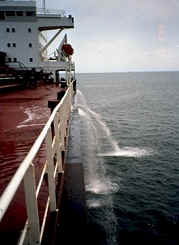Human impact on marine life
Human impact on marine life refers to the effects that humans have on marine ecosystems and the organisms that inhabit them. Human activities, both direct and indirect, have significantly altered the health, structure, and function of the world's oceans, leading to a decline in biodiversity and the degradation of marine habitats. This article explores the various ways in which humans impact marine life, the consequences of these actions, and the efforts being made to mitigate such impacts.
Causes of Human Impact[edit | edit source]
The human impact on marine life can be attributed to several key activities:
Pollution[edit | edit source]
Pollution is one of the most pervasive problems affecting the marine environment. It comes in various forms, including plastic waste, oil spills, agricultural runoff, and chemical pollutants. Plastics, which can take hundreds of years to degrade, pose a significant threat to marine animals through ingestion and entanglement. Chemical pollutants, such as pesticides and industrial runoff, can lead to water pollution that affects the health of marine organisms and the quality of the water.
Overfishing[edit | edit source]
Overfishing occurs when fish and other marine species are caught at a rate faster than they can reproduce. This unsustainable practice leads to the depletion of fish stocks, altering the balance of marine ecosystems and affecting the species that depend on these organisms for food.
Climate Change[edit | edit source]
Climate change, driven by the emission of greenhouse gases, has far-reaching effects on marine life. Rising sea temperatures can lead to coral bleaching and the loss of coral reefs, which are crucial habitats for many marine species. Additionally, ocean acidification, a result of increased CO2 levels, affects the ability of organisms like shellfish and corals to build their skeletons and shells.
Habitat Destruction[edit | edit source]
Human activities such as coastal development, bottom trawling, and the construction of artificial barriers can lead to the destruction of critical marine habitats. Mangroves, seagrass beds, and coral reefs are particularly vulnerable, resulting in the loss of breeding and feeding grounds for many species.
Consequences[edit | edit source]
The human impact on marine life has led to significant ecological consequences, including:
- Loss of biodiversity: The decline in marine species due to overfishing, habitat loss, and pollution reduces the resilience of marine ecosystems and their ability to recover from disturbances.
- Altered ecosystems: The removal of key species through overfishing and habitat destruction can lead to changes in the structure and function of marine ecosystems, often resulting in the dominance of less desirable species.
- Decline in fish stocks: Overfishing has led to the decline of many fish populations, affecting the livelihoods of millions of people who rely on fishing for food and income.
Mitigation Efforts[edit | edit source]
Efforts to mitigate the human impact on marine life include:
- Establishing marine protected areas (MPAs) to safeguard critical habitats and allow ecosystems to recover.
- Implementing sustainable fishing practices to ensure the long-term viability of fish stocks.
- Reducing pollution through better waste management practices and stricter regulations on chemical discharges.
- Promoting awareness and education about the importance of marine conservation.
Conclusion[edit | edit source]
The human impact on marine life is a complex issue that requires global cooperation and concerted efforts to address. By understanding the causes and consequences of our actions, we can work towards more sustainable practices that will ensure the health and vitality of marine ecosystems for future generations.
This article is a environment-related stub. You can help WikiMD by expanding it!
Search WikiMD
Ad.Tired of being Overweight? Try W8MD's physician weight loss program.
Semaglutide (Ozempic / Wegovy and Tirzepatide (Mounjaro / Zepbound) available.
Advertise on WikiMD
|
WikiMD's Wellness Encyclopedia |
| Let Food Be Thy Medicine Medicine Thy Food - Hippocrates |
Translate this page: - East Asian
中文,
日本,
한국어,
South Asian
हिन्दी,
தமிழ்,
తెలుగు,
Urdu,
ಕನ್ನಡ,
Southeast Asian
Indonesian,
Vietnamese,
Thai,
မြန်မာဘာသာ,
বাংলা
European
español,
Deutsch,
français,
Greek,
português do Brasil,
polski,
română,
русский,
Nederlands,
norsk,
svenska,
suomi,
Italian
Middle Eastern & African
عربى,
Turkish,
Persian,
Hebrew,
Afrikaans,
isiZulu,
Kiswahili,
Other
Bulgarian,
Hungarian,
Czech,
Swedish,
മലയാളം,
मराठी,
ਪੰਜਾਬੀ,
ગુજરાતી,
Portuguese,
Ukrainian
Medical Disclaimer: WikiMD is not a substitute for professional medical advice. The information on WikiMD is provided as an information resource only, may be incorrect, outdated or misleading, and is not to be used or relied on for any diagnostic or treatment purposes. Please consult your health care provider before making any healthcare decisions or for guidance about a specific medical condition. WikiMD expressly disclaims responsibility, and shall have no liability, for any damages, loss, injury, or liability whatsoever suffered as a result of your reliance on the information contained in this site. By visiting this site you agree to the foregoing terms and conditions, which may from time to time be changed or supplemented by WikiMD. If you do not agree to the foregoing terms and conditions, you should not enter or use this site. See full disclaimer.
Credits:Most images are courtesy of Wikimedia commons, and templates, categories Wikipedia, licensed under CC BY SA or similar.
Contributors: Prab R. Tumpati, MD





